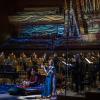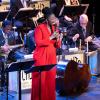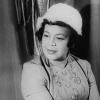
Two conductors shared one podium at Walt Disney Concert Hall on Saturday afternoon, where the Los Angeles Master Chorale (LAMC) closed out its season with a refreshingly down-to-earth concert of sacred music by Duke Ellington and Mary Lou Williams. Standing beside LAMC Artistic Director Grant Gershon was composer and bassist John Clayton, who led his 19-piece Clayton-Hamilton Jazz Orchestra (CHJO) and had a world premiere of his own on the program, Sacred Dreams, Righteous Themes. The combined energy of Gershon, Clayton, and their respective ensembles, plus the rotating cast of charismatic vocal soloists, made for an engaging, uplifting afternoon.
The pairing of Ellington and Williams was an inspired choice. Both were jazz giants who made a lasting impact on American music and turned to writing sacred music later in their careers, not to escape from reality but to engage with the community and foster healing. Selections from Ellington’s three Sacred Concerts — which he called “the most important thing” he’d ever done — made up the first half of Saturday’s program, while the second half included selections from Mary Lou’s Mass, Williams’s social justice-infused liturgical work. For all their historical similarities, Ellington’s and Williams’s stories and music are markedly distinct from each other, a duality that Gershon’s adept storytelling, Thomas May’s program notes, and the curated pieces showcased well.

We heard two contrasting settings of the Lord’s Prayer. Ellington’s was a gorgeous chorale, his only a cappella version of the prayer, which he set many times during his career. Gershon conducted a sensitive, powerful performance that brought out the highs and lows of the piece, emphasizing the introspective, diminished harmonies of the line “Give us this day our daily bread” and stretching out the last cadence to time-bending effect. Williams’s setting of the Our Father was more esoteric and dreamier, featuring soloist Carmen Lundy singing at a luxurious pace atop the smoothly accompanying jazz orchestra and choir.
Lundy’s regal star power shone especially bright during the Williams half of the program; safe to say that the audience was under her spell. When she commanded, “Clap your hands,” in “Praise the Lord (Come Holy Spirit),” the audience wasted no time obeying. In the sultry “Act of Contrition,” Lundy sizzled and slinked down a chromatic scale, vowing “never to sin again” amid a noir-like backdrop of twangy bass, muted trumpets, and tiptoeing drums. Lundy, a seasoned interpreter of Williams’s music, also created the a cappella arrangement for “Tell Him Not to Talk Too Long,” a moving song set to text by Martin Luther King Jr. The rest of the Williams orchestra charts were arranged by Lanny Hartley, whom Gershon acknowledged in the audience.
Countertenor John Holiday sang with a pure tone and satiny legato that made his falsetto crooning sound otherworldly. The audience hollered when he polished off Ellington’s “Heaven” with a casually virtuosic run, flashing his extraordinary range and ending with an innocent smile. Baritone Daniel Rich showed impressive versatility with contemplative spoken word (in Ellington’s “Will You Be There/Ain’t but the One”) and jubilant gospel belts (in Williams’s “The Lord Says”).
Literary artist Reenah Golden performed the spoken-word part and collaborated with Clayton in the creation of Sacred Dreams, Righteous Themes. Golden delivered her lines from a metaphorical pulpit, inquiring, “When was the last time you went to church?” before spinning the words into a message that empowered the audience to consider home, the earth, “oil on canvas,” “clay between fingers,” and joy, the most sacred church of all.

Though the piece felt a bit patchwork (especially the wordless, a cappella opening), it contained many delightful ideas. I especially enjoyed the evolving sound palettes that accompanied Golden’s words and provided emotional subtext — first, a pillowy piano and electric guitar pad with little spurts of piccolo and seedpod shaker; later, the impassioned, steadily crescendoing drums of Jeff Hamilton, co-founder of the CHJO.
This was the first of hopefully many Disney Hall performances for the vibrant big band, who seemed right at home in the venue and blended superbly with the Master Chorale. In many ways, the CHJO was the bedrock of the show, providing an expressive base while individual players sprinkled in personality through their solos. Jacob Scesney’s weightless clarinet playing was a particular highlight.
At the start of the show, Gershon encouraged the audience to, yes, silence our phones but also not to let the preconcert announcement scare us from expressing spontaneous appreciation; the crowd was happy to oblige.




